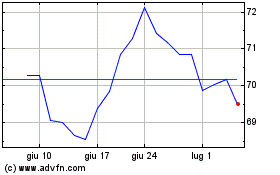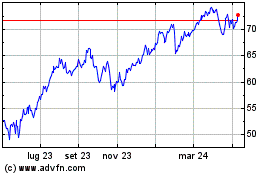Globally-Mobile Employees Are Looking for Enhanced Care on Their Assignments
09 Ottobre 2024 - 2:00PM
Business Wire
Annual study shows that globally-mobile
employees face unique challenges that require a strategic approach
to providing the right resources and support
Employers are increasingly optimistic about the future of
globally-mobile work, with 68% of employers saying they expect it
to increase, up from 45% in 2023. The demographic of those taking
global assignments has also shifted with an increase in younger
employees taking these roles and doing so solo. MetLife's research
shows 42% of employees on global assignments do so alone vs. the
33% with their partner and spouse. This shift in the make up in
globally-mobile workforce is something for employers to take note
of and proactively support this cohort's experiences. According to
MetLife’s Annual Expat Employee Benefit Trends Study (EBTS), just
over half (59%) of employees on global assignments report feeling
holistically healthy. This suggests that multinational employers
have an opportunity to provide the higher level of employee care
and support that globally-mobile employees need to feel confident
on assignment and continue to take on global opportunities.
As the study reveals care as a critical driver of the employee
experience, well-being and benefits, this year’s research notes the
importance of care delivery during and beyond critical work and
life moments that are unique to global assignment experiences.
During important life moments, there is a clear gap between those
employees who say it had a major impact on them and those who felt
their employer demonstrated care during the experience with
navigating unplanned financial stress (13%); burnout (9%); and
health and safety concerns (5%) showing the biggest gaps.
By demonstrating always-on care across key moments, employers
can drive more successful workplaces and healthier outcomes for
their globally-mobile employees. When globally-mobile employees
feel cared for, they are 36% more loyal to their employers, 40%
more productive and 40% more engaged, resulting in increased talent
outcomes and more successful workplaces.
‘If employers can find a way to show additional support to
employees in the form of customized and value-added benefits, the
appetite for global assignments can only increase and result in
increased productivity and loyalty,” says Tim Imre, vice president
and head of MetLife Worldwide Benefits.
In addition to delivering care, employers can enhance their
global mobility programs by revisiting their benefits and
communications strategy, especially by increasing benefits
utilization through audience-specific education, such as targeted
communications and training on how to use available benefits.
Sixty-four percent (64%) of employees say that the benefit
communications they receive do not feel relevant to their
experience and 72% wish they were more informed about their
offering so they can get the most value out of their benefits,
highlighting an opportunity for employers to tailor their benefit
offerings and communications to resonate most with this cohort and
their specific needs.
“This data clearly shows that providing benefits education even
before employees are on an assignment—letting them know that
support and resources that are available to them—is a key component
in preparing employees to accept the opportunities when they
arise,” Imre added.
The full Expat EBTS report is available at
www.metlife.com/ebtsexpat. All data included here is based on the
findings in the report.
Research Methodology
This report is based on MetLife’s Annual Employee Benefit Trends
Study and provides insights from employers and globally-mobile
employees captured via in-depth quantitative surveys. The survey
findings were supplemented by qualitative interviews with
globally-mobile employees. MetLife’s 22nd Annual U.S. Employee
Benefit Trends Study was conducted in November 2023 and consists of
two distinct studies fielded by STRAT7 Rainmakers – a global
strategy, insight and planning consultancy.
The employer survey includes 2,595 interviews with benefits
decision-makers and influencers at companies with at least two
employees. The survey includes 1,195 interviews with
decision-makers with responsibility for expatriate benefits.
The employee survey consists of 2,809 interviews with full-time
employees, ages 21 and over, at companies with at least two
employees. The survey includes 660 interviews with globally-mobile
employees. To provide additional context to our quantitative
findings, we conducted 26 interviews with employees and
partners/spouses of employees and 6 U.S. employers with global
mobility programs. We recruited participants to ensure a spread of
demographics, incomes, worker types, industries and business
sizes.
About MetLife
MetLife, Inc. (NYSE: MET), through its subsidiaries and
affiliates (“MetLife”), is one of the world’s leading financial
services companies, providing insurance, annuities, employee
benefits and asset management to help individual and institutional
customers build a more confident future. Founded in 1868, MetLife
has operations in more than 40 markets globally and holds leading
positions in the United States, Asia, Latin America, Europe and the
Middle East. For more information, visit www.metlife.com.
About MetLife Worldwide Benefits
MetLife Worldwide Benefits personalized solutions for
globally-mobile employees have been in existence for nearly 60
years. MetLife Worldwide Benefits products are underwritten by
Delaware American Life Insurance Company, a MetLife affiliate
domiciled at 600 North King Street, Wilmington, DE, 19801, and
other affiliates. For more information, visit
www.metlifeworldwide.com.
View source
version on businesswire.com: https://www.businesswire.com/news/home/20241008418432/en/
Media Contact: Kimberly Prime 908-524-5674
kprime@metlife.com
Grafico Azioni MetLife (NYSE:MET)
Storico
Da Gen 2025 a Feb 2025

Grafico Azioni MetLife (NYSE:MET)
Storico
Da Feb 2024 a Feb 2025
